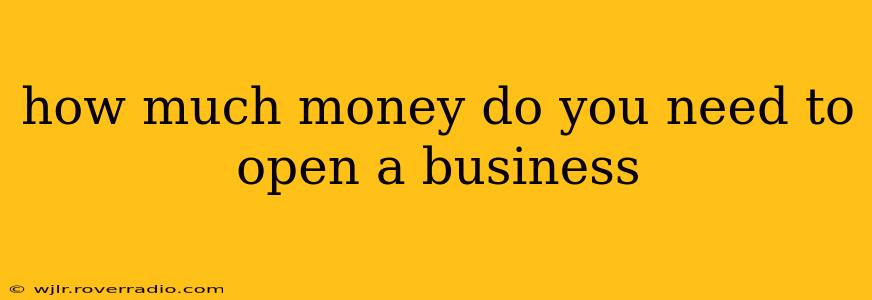How Much Money Do You Need to Open a Business? A Deep Dive into Startup Costs
Starting a business is exciting, but the financial aspect can be daunting. The question, "How much money do you need to open a business?" doesn't have a simple answer. The required capital varies wildly depending on several key factors. This comprehensive guide will explore those factors and help you estimate your startup costs.
Factors Determining Startup Costs:
Several crucial elements influence the amount of money you'll need to launch your venture. These include:
-
Business Type: A small home-based bakery will require significantly less capital than a manufacturing plant or a tech startup. Service-based businesses often have lower initial costs compared to product-based businesses needing inventory and manufacturing equipment.
-
Industry: The industry you enter greatly impacts your expenses. Some industries, like technology, have high research and development costs, while others, like retail, have significant upfront inventory investment requirements.
-
Scale: Are you aiming for a small, local business or a large-scale operation? Your ambition directly correlates with your financial needs. A larger operation requires more investment in infrastructure, technology, and staffing.
-
Location: Rent, utilities, and labor costs differ dramatically depending on your location. A bustling city center will command higher expenses than a rural area.
-
Legal Structure: The legal structure you choose (sole proprietorship, LLC, corporation, etc.) influences initial fees and ongoing compliance costs.
What Are the Typical Startup Costs?
Let's break down the common categories of startup costs:
1. Initial Startup Costs: This covers the expenses you incur before opening your doors.
-
Business Registration and Licenses: Fees vary by location and business type. This includes obtaining your business license, EIN (Employer Identification Number if applicable), and any necessary permits.
-
Legal and Professional Fees: You might need a lawyer for contract drafting or business structuring, an accountant for tax advice, and potentially other professional services.
-
Equipment and Supplies: This covers all the tools, machinery, and materials needed for your business operations. For example, a restaurant will need kitchen equipment, while a software company will need computers and software licenses.
-
Inventory: If you're selling products, you'll need to purchase initial inventory to meet demand.
-
Marketing and Advertising: Establishing your brand and attracting customers requires a marketing budget, which may include website development, social media marketing, print advertising, or other promotional materials.
-
Pre-opening Expenses: This includes expenses incurred before the official launch, like rent, utilities, and employee training (if applicable).
2. Ongoing Operational Costs: These are the expenses you'll incur after opening your business.
-
Rent or Mortgage Payments: If you're renting or leasing space, you'll have ongoing rent payments.
-
Utilities: Electricity, water, gas, internet, and phone services are all necessary operational expenses.
-
Salaries and Wages: If you're hiring employees, you'll need to factor in their salaries, benefits, and payroll taxes.
-
Insurance: Business insurance is crucial for protecting against liability and unforeseen circumstances.
-
Marketing and Advertising: Ongoing marketing efforts are essential for customer retention and acquisition.
-
Supplies and Inventory: Replenishing supplies and inventory is an ongoing expense for many businesses.
How Much Money Do You Need for Different Business Types? (Examples)
Providing exact figures is impossible without knowing the specifics of your business, but here are some rough estimates:
-
Home-based businesses (e.g., freelance writing, online tutoring): Can start with relatively low costs, potentially under $1000, but might require several thousand for equipment and marketing.
-
Small retail stores: Could range from $10,000 to $100,000 or more, depending on location, inventory, and size.
-
Restaurants: Typically require significant investments, often exceeding $50,000 and potentially reaching hundreds of thousands of dollars.
-
Technology startups: Can require millions of dollars in seed funding and beyond for development, marketing, and scaling.
How to Determine Your Startup Costs:
-
Develop a Detailed Business Plan: A comprehensive business plan will force you to meticulously outline all your anticipated expenses.
-
Research Industry Benchmarks: Look for industry reports or data to get a sense of average startup costs in your specific field.
-
Create a Realistic Budget: Include all potential costs, including contingencies for unforeseen expenses. It's better to overestimate than underestimate.
-
Seek Professional Advice: Consult with a financial advisor or accountant to get personalized guidance on funding options and financial planning.
Where Can You Get Funding?
Securing funding is often the most challenging aspect. Options include:
-
Personal Savings: This is often the primary source of funding for many small businesses.
-
Loans (Small Business Administration (SBA) loans, bank loans): These require creditworthiness and a solid business plan.
-
Investors (Angel investors, venture capitalists): These are typically sought by high-growth businesses with significant potential.
-
Crowdfunding: This involves raising funds from a large number of individuals through online platforms.
Starting a business requires careful financial planning. By understanding the various costs involved and exploring different funding options, you can significantly increase your chances of success. Remember to be realistic, thorough, and prepared for unexpected challenges.
